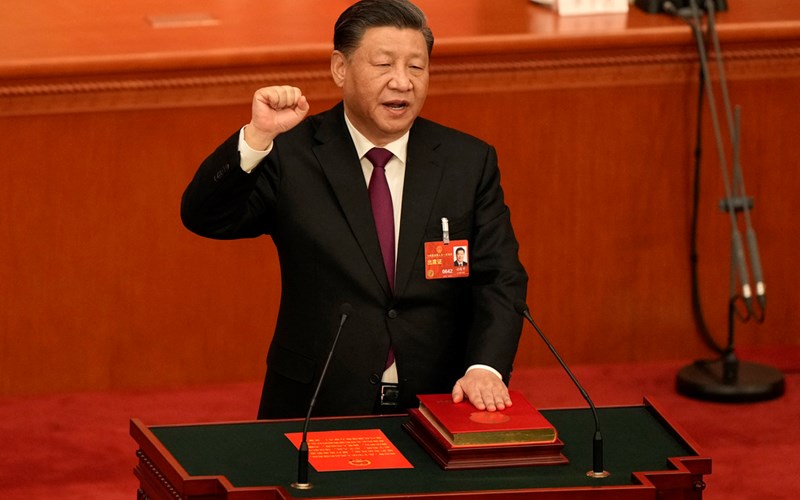In light of secretive diplomatic handshakes in recent months, President Xi is now bragging about new partnerships with former rivals Saudi Arabia and Iran. That announcement caught the sleeping Biden administration by surprise, The Washington Post reported, since the U.S. is using its own diplomats to attempt to isolate China.
In fact, in a speech Monday to China’s parliament, the National People’s Congress, President Xi directly accused the United States of attempting to “contain, encircle and suppress” China.
According to news reports, it is rare for China's leaders to call out the U.S. by name, so Xi's not-so-subtle threat got noticed in Washington, D.C. After the speech, China's foreign minister Qin Gang warned of "conflict and confrontation" if the United States "continues to speed down the wrong path."
The diplomat did not mention Taiwan in his comments to the national media but a military fight over the island country is growing closer each day, according to a four-star U.S. Air Force general, among others.
In his same speech, President Xi thanked the rubber-stamping delegates for unanimously “electing” him president of the Chinese Communist Party for an unprecedented third term.
“This is my third time assuming the lofty position as president,” Xi said in his speech. “The trust of the people is the biggest driving force for me to move forward, and also a heavy responsibility on my shoulders.”
Bob Maginnis, a national security expert at the Family Research Council, views China as a serious threat to the United States and its allies, but he agrees with one thing: Xi is bearing a big responsibility as the nation’s leader. One issue, he tells AFN, is feeding a population of 1.4 billion people.
 “China has far less agricultural land than does the United States, by a number of orders,” Maginnis advises. “And so it must have massive imports of food stuffs.”
“China has far less agricultural land than does the United States, by a number of orders,” Maginnis advises. “And so it must have massive imports of food stuffs.”
China’s dependence on food imports has gotten the attention of various groups, including the globalist World Economic Forum, which estimates 80% of soybeans consumed in China are imported.
One out of every four rows of soybeans grown in Iowa is exported to China, according to an Iowa State University study, which estimates China has many more farmers than the U.S. – many of them poor – but also half the arable land for farming.
A second study on China’s imports, by the Council on Foreign Relations, said China’s arable land is decreasing while the country’s growing middle class is demanding higher-quality foods that come from overseas. That study, published in January, points out China endured the so-called Great Famine in 1959-1961, the worst famine recorded in human history. That famine was sparked by the Great Leap Forward, a policy implemented by Mao Zedong in which tens of millions starved when farmers were ordered to stop plowing and start manufacturing.
That shameful chapter in China’s history is not mentioned among Communist Party members, the CFR story admits, but many of them – including President Xi - lived through it and understand holding on to power requires food security.
 And that is why Maginnis views Xi’s threats as thunderous but hollow, especially since China is attempting to purchase farmland across the world, including in the United States.
And that is why Maginnis views Xi’s threats as thunderous but hollow, especially since China is attempting to purchase farmland across the world, including in the United States.
“That is problematic,” he says of China’s dependence on food imports, “and I think we should use our ability to produce so much food to restrict them.”
Against that backdrop of feeding a billion-plus people, Maginnis says economists are also watching China’s powerful manufacturing base slow down because many of those jobs are moving to other less-developed countries.
Sure enough, CNBC reported last fall China is losing its status as “factory of the world” as assembly lines to make clothing, footwear, and furniture shift to Vietnam, Malaysia, Bangladesh, India, and Taiwan. Among those nations, Vietnam is witnessing the largest growth – 360% since 2014 – in new manufacturing jobs.

In one example, Apple announced late last year it was slowing its dependence on China’s “iPhone cities” to make its flagship product. More of those jobs are shifting to Vietnam and to India, The Wall Street Journal reported at the time.
Much like food in the belly, those jobs keep China’s people employed and satisfied.
According to Maginnis, he is skeptical about China’s pivot to a “circular economy” that reuses and recycles its own products and materials, such as paper, scrap metals, and even crop stalks. The country’s communist leaders have touted that policy for decades but Maginnis views it as a negative sign.
“If you’re turning to a command circular economy, and not one that is products that the world demands,” he concludes, “then you’re going to have a hard time growing an economy.”







